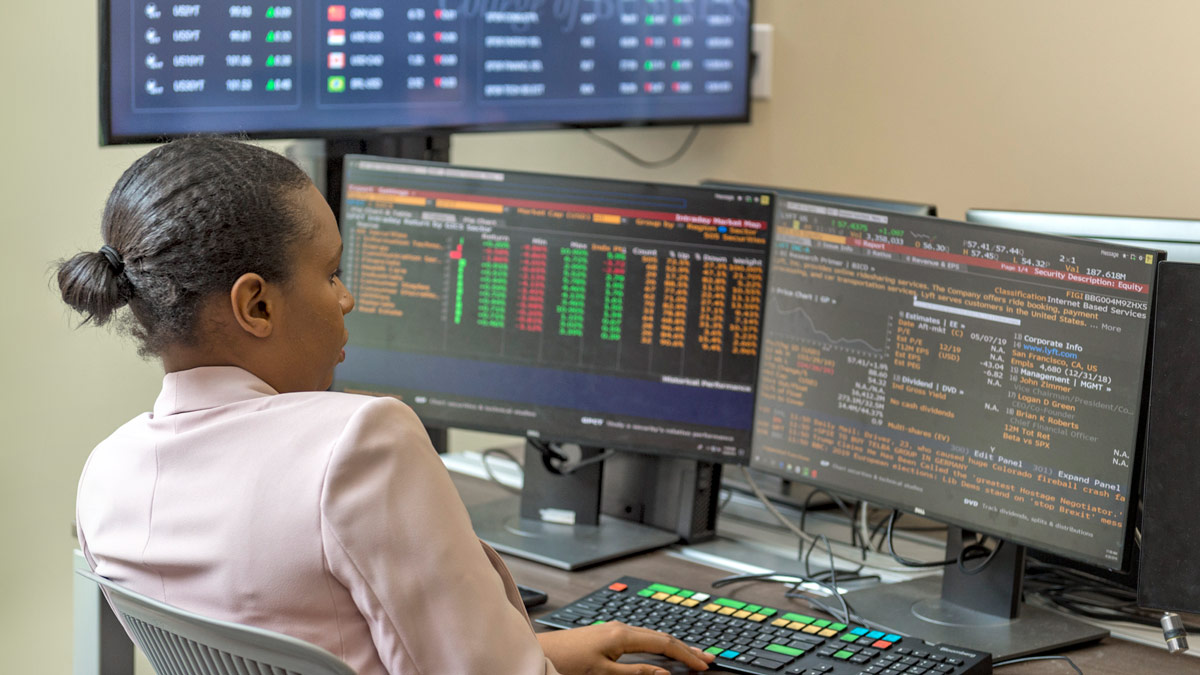Finance Master of Science Degree

Finance
Master of Science Degree
- RIT /
- Rochester Institute of Technology /
- Academics /
- Finance MS
MS in finance covering fundamentals and specializations in FinTech: AI, algorithmic trading, data science, blockchain, and cryptocurrency.
$66.9K
Average First-Year Salary of RIT Graduates from this degree
#28
Best Master’s in Finance Programs
#27
Best Master’s in Corporate Finance
Overview for Finance MS
Why Study RIT’s Master of Science in Finance
STEM-OPT Visa Eligible: The STEM Optional Practical Training (OPT) program allows full-time, on-campus international students on an F-1 student visa to stay and work in the U.S. for up to three years after graduation.
Manage a real $400,000+ investment portfolio with the Finance Management Association.
Highly flexible program includes exposure to software including Python, R, Tableau, Matlab, SAS, and SQL
Quantitative and Technical Training: Elective courses build practical and theoretical skills for careers in FinTech and quantitative finance, including positions such as Quantitative Analyst, Data Analyst, Data Scientist, Quantitative Researcher, Financial Engineer, Portfolio Manager, Quant Trader, and Algorithmic Trader.
The curriculum is designed to prepare you to take the Chartered Financial Analyst® (CFA) exam.
Today’s finance industries are highly data-driven and analytics-based. RIT's master of science in finance emphasizes practical technical skills—such as data science, artificial intelligence (AI), and financial analytics tools—preparing you for successful careers in traditional finance roles, such as corporate finance, investment analysis, wealth management, portfolio management, financial consulting, commercial banking, investment banking, and insurance. Through dynamic elective courses, you will also develop a deep specialization in emerging FinTech fields, including algorithmic trading, blockchain, cryptocurrency, financial analytics, and artificial intelligence (AI) applications in finance.
This is a highly flexible program with a strong emphasis on experiential learning opportunities, enabling you to apply your knowledge in real-world scenarios. Accessing Bloomberg Terminals in the Sklarsky Center for Business Analytics, you tap into the latest financial market developments while having the tools to analyze and develop unique insights.
RIT’s Finance Master’s Degree
Today’s finance industries are data-driven and analytics-based. As a result, RIT’s finance master’s degree includes projects and teaching materials that expose you to financial analytics skills and software. In this highly flexible program, you’ll complete core courses in accounting, corporate finance, investments, options and futures, international finance, risk management, portfolio management, and more.
The MS in Finance program also combines foundational finance knowledge with cutting-edge technical skills, preparing graduates to thrive in today’s data-driven financial industry. This unique curriculum emphasizes advanced financial analytics and the application of AI-driven technologies to real-world challenges.
Students gain expertise through core courses and can customize their learning with electives in specialized areas such as:
- Artificial Intelligence and Machine Learning (AI/ML): Explore the intersection of data science and finance with coursework covering machine learning, deep learning, natural language processing (NLP), and large language models (LLMs). Learn how these technologies power forecasting, risk modeling, and financial text analysis, equipping you to leverage AI for smarter financial decision-making.
- Advanced Financial Analytics: Develop in-demand technical skills for investment analysis, portfolio construction, risk management, and security valuation. Gain hands-on experience with industry-standard tools like Python, R, and SAS while mastering techniques such as time-series modeling and text mining. Students also have access to additional data analytics courses at Saunders College, expanding proficiency in tools like Power BI, Tableau, Matlab, and SQL.
- Hands-on Algorithmic Trading: Apply quantitative models in a lab-based algorithmic trading course. Design and test trading strategies using a computerized platform that supports extensive back-testing on thousands of stocks, bridging theory with real market behavior.
Additionally, top finance master's programs, like RIT's master of science in finance, prepare you to take the Chartered Financial Analyst® (CFA) exam–the most respected and recognized investment management designation in the world.
Why Choose RIT's Finance Master's Degree?
Discover why RIT's master of science in finance is the ideal choice for building advanced, future-ready expertise in finance and FinTech. The degree:
- Integrates finance and artificial intelligence (AI) for a future-ready skill set.
- Offers practical, hands-on learning with real-world applications.
- Builds expertise in financial analytics, machine learning, and algorithmic trading.
- Prepares graduates for careers in quantitative finance, risk management, fintech, and data-driven investment strategies, as well as traditional fields such as personal financial planning and corporate financial management.
Leading Finance Faculty
Saunders’ finance faculty are prestigious researchers who actively contribute to elite research journals, covering traditional finance topics and cutting-edge areas such as AI applications in finance, financial text mining, high-frequency trading, stock/option trading strategies, NFT, cryptocurrencies, and blockchain. Our faculty members bring valuable industry expertise to their classrooms while maintaining solid connections with industry professionals.
-
Affordable Now. Valuable for Life.
Earn your master’s degree without the full price tag. With Master Up you can receive a 30% tuition scholarship for an RIT master’s degree.
-
Meet us on-campus on February 19
Learn about the programs that interest you. Hear from program faculty, speak with current graduate students, and ask the questions that will help you get one step closer to your career goals.
Careers and Experiential Learning
Typical Job Titles
| Chief Executive officer (CEO) | Chief Financial Officer (CFO) | Credit Risk Analyst |
| Controller | Data Analyst | Director, Corporate Strategy |
| Director, Financial Planning and Analysis | Financial Advisor | Financial Analyst |
| Finance Director | Financial Engineer | Financial Planner |
| Investment Banker | Loan Officer | Portfolio Manager |
| Quantitative Analyst | Quantitative Investment Analyst | Research Associate |
| Risk Analyst | Trader | Vice President, Finance |
Cooperative Education and Internships
What makes an RIT education exceptional? It’s the ability to complete relevant, hands-on career experience. At the graduate level, and paired with an advanced degree, cooperative education and internships give you the unparalleled credentials that truly set you apart. Learn more about graduate co-op and how it provides you with the career experience employers look for in their next top hires.
Co-ops and internships take your knowledge and turn it into know-how. Business co-ops provide hands-on experience that enables you to apply your knowledge of business, management, finance, accounting, and related fields in professional settings. You'll make valuable connections between course work and real-world applications as you build a network of professional contacts.
Cooperative education is optional but strongly encouraged for graduate students in the finance program.
Finance Careers
Graduates of RIT's master of science in finance are prepared for outstanding career opportunities in a range of finance positions. Our alumni are employed at diverse firms such as AMG Technology, T3 Trading Group, LLC, TD Securities, MAI Capital Management, and more. Our Finance Industry Advisory Board helps students prepare for their careers by ensuring the curriculum is continuously updated to meet employers needs while providing networking and mentorship opportunities.
Our alumni are employed at diverse firms such as AMG Technology, Citi Group, Fannie Mae, Fidelity Investments, Goldman Sachs, KPMG, MAI Capital Management, Paychex, T3 Trading Group, LLC, TD Securities, and more.
Featured Work and Profiles
-
RIT students win international Bloomberg trading competition
In just its second year competing, a trio of RIT students won the 2024 Bloomberg Global Trading Challenge as the “Tigers Trading” team.
Read More about RIT students win international Bloomberg trading competition -
STEM-Powered Success: Saunders Faculty and Curriculum Help Graduate to Role
Edith Udegbe ’22 Citi | Buffalo, New York "What I learnt in the classroom [at Saunders] are closely related to my current real-life job experience and prepare me well for my new role at Citi."
Read More about STEM-Powered Success: Saunders Faculty and Curriculum Help Graduate to Role -
Guided by RIT’s Dedicated Professors from Beijing
Chang Su ’21 Siemens | Houston, Texas, "At Saunders, you're not 1 of 100. There is individualized attention to determine what's beneficial for you. The professors are diverse and understand the challenges faced...
Read More about Guided by RIT’s Dedicated Professors from Beijing -
Research Insights: Benefits of a seeming monopoly
Hao Zhang How common institutional ownership reduces stock price crash risk
Read More about Research Insights: Benefits of a seeming monopoly -
Dynamic Courses, Co-ops, and Study Abroad Prepared Saunders Grad
Machelle Boisvert ’23 ’23 Goldman Sachs | Dallas, Texas, "Saunders College of Business does a great job of preparing students for the job market through dynamic course offerings, emphasis on co-ops for practical experience,...
Read More about Dynamic Courses, Co-ops, and Study Abroad Prepared Saunders Grad -
Research Insights: Board reforms improve financial reporting
Rong Yang Bringing higher audit fees and increased transparency
Read More about Research Insights: Board reforms improve financial reporting
Curriculum for 2025-2026 for Finance MS
Current Students: See Curriculum Requirements
Students are also interested in
Admissions and Financial Aid
This program is available on-campus only.
| Offered | Admit Term(s) | Application Deadline | STEM Designated |
|---|---|---|---|
| Full‑time | Fall or Spring | Rolling | Yes |
| Part‑time | Fall or Spring | Rolling | No |
Full-time study is 9+ semester credit hours. Part-time study is 1‑8 semester credit hours. International students requiring a visa to study at the RIT Rochester campus must study full‑time.
Application Details
To be considered for admission to the Finance MS program, candidates must fulfill the following requirements:
- Complete an online graduate application.
- Submit copies of official transcript(s) (in English) of all previously completed undergraduate and graduate course work, including any transfer credit earned.
- Hold a baccalaureate degree (or US equivalent) from an accredited university or college. A minimum cumulative GPA of 3.0 (or equivalent) is recommended.
- Submit a current resume or curriculum vitae.
- Submit a personal statement of educational objectives.
- Letters of recommendation are optional.
- Entrance exam requirements: GRE or GMAT is optional, but recommended for individuals with degrees from international universities
- Submit English language test scores (TOEFL, IELTS, PTE Academic, etc.), if required. Details are below.
English Language Test Scores
International applicants whose native language is not English must submit one of the following official English language test scores. Some international applicants may be considered for an English test requirement waiver.
Duolingo (DET): 130
IELTS: 6.5
LanguageCert Academic: 74
PTE Academic: 60
TOEFL: 88/4.5
International students below the minimum requirement may be considered for conditional admission. Deaf and hard-of-hearing test takers with significant hearing loss do not need to take the listening and speaking sections for the TOEFL and IELTS. Each program requires balanced sub-scores when determining an applicant’s need for additional English language courses.
How to Apply Start or Manage Your Application
Cost and Financial Aid
An RIT graduate degree is an investment with lifelong returns. Graduate tuition varies by degree, the number of credits taken per semester, and delivery method. View the general cost of attendance or estimate the cost of your graduate degree.
A combination of sources can help fund your graduate degree. Learn how to fund your degree
Accreditation
Related News
-
February 27, 2025

Saunders ranks among TFE Times’ top graduate programs
Saunders College of Business at Rochester Institute of Technology received several rankings from TFE Times on their Top Graduate Programs lists for 2025:
-
February 7, 2025

Bloomberg Enriches Financial Education for 10,000 Students through Global Trading Challenge
Bloomberg reports on the RIT team that won the 2024 Bloomberg Global Trading Challenge.
-
January 2, 2025

RIT trio triumphs in global trading challenge
The team, supported by faculty adviser and finance professor Hao Zhang, won the 2024 Bloomberg Global Trading Challenge.
Contact
- Delaney Ball
- Assistant Director
- Office of Graduate Admissions
- Enrollment Management
- 585‑475‑6933
- Delaney.Ball@rit.edu
- Matthew Cornwell
- Associate Director of Student Services
- Student Services
- Saunders College of Business
- 585‑475‑6916
- mcornwell@saunders.rit.edu
Saunders College of Business























